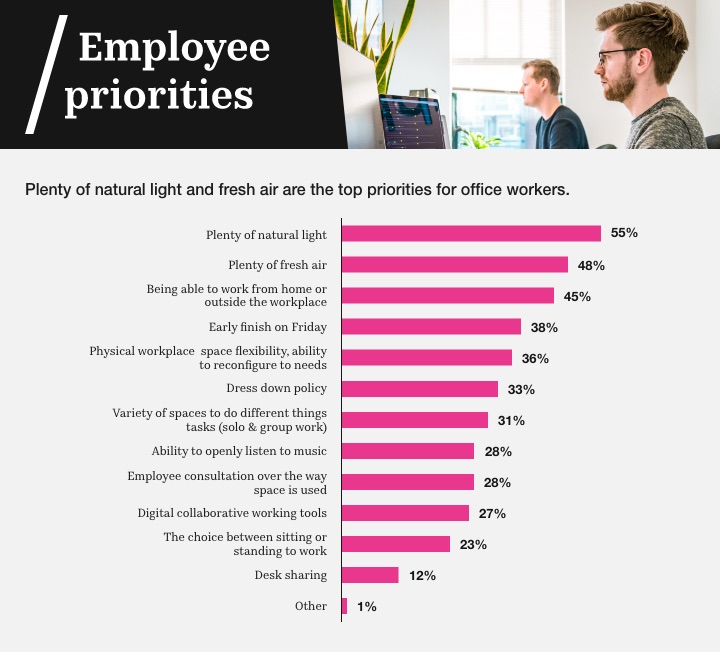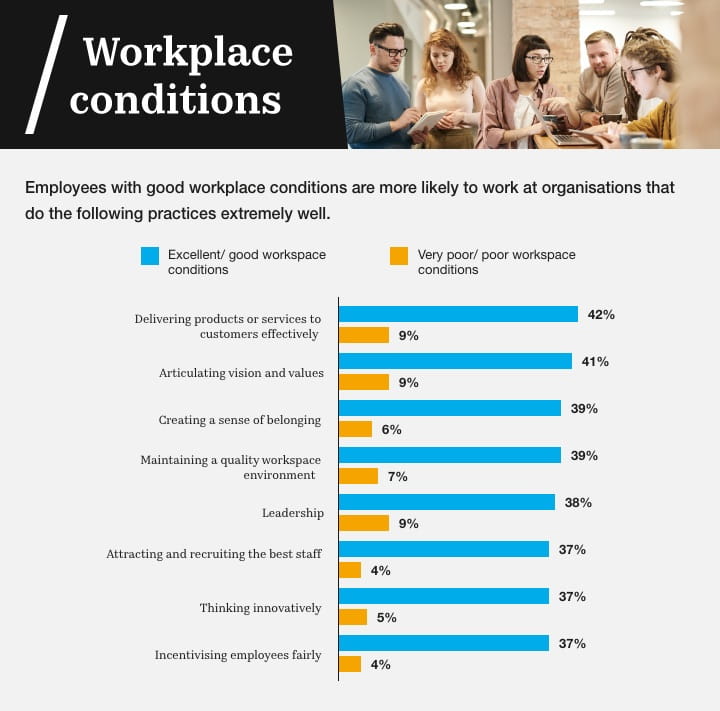
The workplace is constantly evolving. The rise of remote working has given many office workers in 2020 the kind of flexibility they have always wanted. But it turns out this way of working is not for everyone.
New data shows that 38% of employees say they have felt lonelier or more isolated this year, while almost half (41%) feel less connected to their company or co-workers [1].
Despite the strain that remote working can have upon both wellness and productivity, majority of office workers would like at least some level of flexibility to work remotely. This implies not only during times of change and uncertainty but throughout the rest of their careers with only 9% wanting to work from the office full-time in the future [2].
The need for a two-way communication between employees and businesses has never been greater with employees taking an active role in expressing their preferences and employers adapting the workplace to inspire their people and increase productivity.
The power of place
To find out what workers around the world value the most, ISG spoke to 5,779 workers in six countries [3]. The results from this global survey are helping businesses to understand the importance of creating a positive working environment and the impact it has upon business performance.
ISG revealed that an office that is well-located and easy to commute to is hugely important not only for office-based workers but also for employees who have the flexibility to work remotely.
Most employees (57%) prioritise a good office location that is easy to commute to, but almost as many employees (45%) say that the ability to work remotely is important to them. The significance of location varies by sector and it is particularly important for public sector workers compared to other industries.
If more companies allow their staff to work remotely in the long-term it will potentially impact the importance of location. To fulfil the needs of different types of workers, employers must, therefore, consider both location and flexibility together as factors that simultaneously affect each other.

“When considering your workspace, it is important to remember that all people respond to their environments differently.”
Hannah Baker, a clinical trainee psychologist
What is your workplace personality type?
With so much uncertainty about the future of working, you may have found yourself with more time to reflect on what you want from your career and the type of environment you want to work in.
To help you understand the workplace conditions that are best for boosting your own productivity, ISG worked with Hannah Baker, a clinical trainee psychologist, to devise a Workplace Personality Test.
In the graphic below, we have created 10 statements that are geared towards understanding which personality traits of the Big Five theory are more prominently present in your character: extraversion, agreeableness, conscientiousness, stress, and openness to experience.
“When considering your workspace, it is important to remember that all people respond to their environments differently,” says Baker. “Individuals who are more introverted might find thinking independently in a quiet space most helpful. Extroverts, however, might prefer a busy office space, where they can exchange ideas and information with others.”
To find out what your workplace personality type is, answer the statements here.
What do all workers want from their workplace?
Regardless of what industry you work in or what personality traits you possess, ISG found that the desire for plenty of light and natural fresh air in a workplace trumps everything else. This is now putting more pressure on employers to create a workplace that accommodates both. However, the particular design decisions that are made during an interior fit out can make a huge difference to how well the space engages staff and sparks productivity.
Although 35% of workers we surveyed have the option for desk sharing now, only 12% believe it is important to their satisfaction or productivity.

It’s possible that with the rise of remote working and the introduction of more stringent safety measures for employers to follow, we could see the availability and, indeed, the appeal of hot desking decline further. This could have a similar impact on open plan offices too. Almost three-quarters of workers (71%) believe that working in a personal office makes them more productive, compared to 62% who say they thrive in an open plan office.
Matt Hurrell, ISG’s director for fit out business said: “The Covid-19 scenario has proven the ability and desire to work remotely more routinely is likely to accelerate changes in the workplace. Consequently, it is probable that there will be a reduction in the allocation of desk space in the typical office, but this might be offset with a likely increase in the space attributed to social engagement, which is still important to bring teams together, enhance collaboration and creative thinking. In tandem with a growing awareness and consideration of neurodiversity and well-being in the workplace, this may mean that a greater emphasis is being placed on light, sound and a further enhancement in the flexibility of workspace area.”
“It is probable that there will be a reduction in the allocation of desk space in the typical office, but this might be offset with a likely increase in the space attributed to social engagement.”
Matt Hurrell, ISG’s Director Fit Out
Where do the happiest workers live?
ISG found that UK employees working in Edinburgh tend to have highest satisfaction about their workplace conditions, followed by workers in London. At the other end of the scale, employees working in Cardiff say they are the least satisfied by their workplace.
It is likely that in the future we will see more disparity between where employees live and where they work. The expansion of remote working has meant that many people now consider living further away from their office, knowing they do not have to commute as often as they may have done in the past. This is especially true for younger workers. Only 59% of workers aged 18-23 say that the location of an office is a decisive factor for them, compared to 68% of over-55s.
Commenting on the findings, Matt Hurrell, said: “The recovery of personal time through remote working, due to reduced commuting, plays an important role in what office spaces need to become. This could involve incorporating more aspects that allow them to be more attractive by virtue of the facilities or experiences that they offer which would make them a worthwhile destination. Equally, businesses may recognise the cost of maintaining significant city centre hubs is not required anymore and may adjust to more cost-effective regional offices that are closer for their workforce overtime as leases expire.”
“Businesses may adjust to more cost-effective regional offices that are closer for their workforce overtime as leases expire.”
Matt Hurrell, ISG’s Director Fit Out
Why employers need to invest in their workplace
Even with the rise of remote working, there is no doubt that business that invest in their workplace perform better than those who do not. Some 42% of employees in the UK who believe they work in a high-quality workplace say their company is extremely good at delivering products or services, compared to just 9% of employees who work in poor conditions.
Similarly, UK employees who work in a high-quality workspace are six times more likely to feel a sense of belonging to their company (39%) than employees who work in a poor workspace (6%).

Creating a high-quality environment is even more important for employers when you consider that one in three employees (36%) are thinking about leaving their job within the next year. However, half of those people say they would change their decision if their company underwent comprehensive, internal works to upgrade their workplace in the next year.
Despite the uncertainty that they’re dealing with right now, the results of our research make it clear to employers that a physical workspace is not something to neglect but something to invest in when they are able to do so again.
In any business you’ll find different personalities. But all of them need space to grow.
[1] https://www.perkbox.com/uk/resources/blog/how-has-2020-impacted-employee-wellbeing
[2] https://www.perkbox.com/uk/resources/blog/how-has-2020-impacted-employee-wellbeing
[3] This survey was conducted by ISG among 5,779 office workers in companies of 250+ employees, including 1460 with decision making authority over HR, recruitment & retention, from the following countries: UK (2006), Germany (1008), Spain (1000), Hong Kong (251), Singapore (1000) and Malaysia (514).